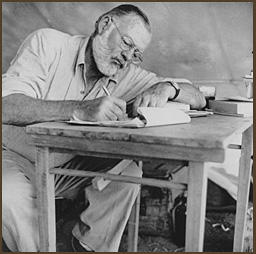Absalom, Schmabsalom! Let's work the whole thing out...
 "The aim of every artist is to arrest motion, which is life, by artificial means and hold it fixed so that a hundred years later, when a stranger looks at it, it moves again since it is life. Since man is mortal, the only immortality possible for him is to leave something behind him that is immortal since it will always move. This is the artist's way of scribbling 'Kilroy was here' on the wall of the final and irrevocable oblivion through which he must someday pass."
"The aim of every artist is to arrest motion, which is life, by artificial means and hold it fixed so that a hundred years later, when a stranger looks at it, it moves again since it is life. Since man is mortal, the only immortality possible for him is to leave something behind him that is immortal since it will always move. This is the artist's way of scribbling 'Kilroy was here' on the wall of the final and irrevocable oblivion through which he must someday pass."- William Faulkner

- Ernest Hemingway

"Poor Faulkner. Does he really think big emotions come from big words? He thinks I don't know the ten-dollar words. I know them all right. But there are older and simpler and better words, and those are the ones I use."
- Ernest Hemingway
Nobel Prize pissing contest anyone?
Faulkner: I'm clearly raised to a higher level of intellectual prowess. This is apparent because in my pictures I'm perusing over a volume of great literature.
Hemingway: No way pansy-pants. I'm smarter because in my picture I'm actually writing a book.
Faulkner: How do I know that's actually a novel? From this vantage point it would appear to be simply a voluminous pad of paper. Let me see that... Ernest, all you've written on here is 'My big fish is bigger than your big fish!' over and over again.
Hemingway: Yeah, well, how... how do I know you're even reading that book?
Faulkner: Don't be an imbecile, Hemingway.
Hemingway: Oh big words Willy! Well you know what? Your tie is stupid.
Do you like the first scene of my new play? It's sort of Copenhagen but set in America and more geared towards literature than theoretical physics. I think that it's going to be a big hit.
Actually, I don't really have much to say about either Faulkner or Hemingway. I haven't read more than was required for my Great American Writers class in high school and to tell the truth I wasn't that big a fan of Old Man and the Sea or As I Lay Dying. No, what interests me more is the polemic between people that I have illustrated so eloquently above. You can divide the world a lot of different ways but one of them seems to be along the lines of people who prefer to complicate matters and those who'd rather leave things simple.
You know the complicators, they have to overdo and add on to every idea. Nothing is ever really complete and there's always one last extra touch to throw in. They want to pile on as much stuff as they can so that those around them get lost in the maze of complexity. In life they over analyze and criticize and tend to be rather unable to let sleeping dogs lie. And then there are the simplifyers. The people who don't own furniture. The ones who try to pair down their schedules to the basic necessities. The people who just go with the flow and don't try to fix it if it ain't broke.
I'm not going to bother elaborating too much more on the qualities of each type of person, I think that most of my readers are quick enough to sort out the differences and which area they and their near and dear fall into. I think that I've resigned myself to being a complicator, I own too many kitchen appliances to ever qualify as a simplifyer. But let me note that I'm a complicator who longs for the simple life.
But the longing and the path to actualization are two very different things.
Does anyone else ever find themselves explaining a concept to another person and at some point realizing they've probably got what you're talking about. However, you haven't really completed the thought that you started and thus you continue talking for another paragraph or two just for completeness sake? Maybe you too find that sometimes your thoughts run so far ahead of your speech that you actually start tripping over or even combining words as you talk in an effort to get them all out as quickly as possible... Or maybe you reader also have the unfortunate inclination I find myself guilty of in which you start telling a rather simple story and in the process realize there is another tangent story whose information could marginally improve the understanding of the first. Meaning that you must now veer off into a second story set simply to get back to the original. And maybe if you're really lucky you'll start a third story in parentheses to the first two so that the listener really has the full context of the tale... Of course half the time I forget the original narrative line, so busy have I been interrupting myself with other ones. Lest you need an example, simply scroll down to my last post. I started telling about one dream and managed a whole section about another one in great detail just to point out a contrast.
But I digress.
I've been reading a lot of Khalil Gibran lately as I prepare to embark on a directing project surrounding his work. From what I've read via biographies and what have you's, Gibran was the epitome of the complicator. His life was a laundry list of obsessions and neuroses over the events he took part in. He'd write and re-write works, nit-pick them and fly into rages over imperfections. He wrote copious amounts of letters, the shear volume of which is staggering, far outweighing the body of his "legitimate" work most of which centered around his constant struggle over and over to do things "right". And yet, despite his high flown phrases and lyrical poems, Gibran's work consistently centered around the theme of simplicity. His characters always were working to reach his ideal of the innocent, child-like and naive state of mind. Many of my favorite theater makers: Mnouchkine, Taymor, Zimmerman, are women who's lives, one can attempt to guess at, are filled with all the complication and obsession with detail that Type-A people seem to carry around. And yet interestingly these are the people who voice a consistent commitment to return to the simplicity and ritual nature of the art of theater. I like the inherent paradox in this. As if, in some way, we seek that which we are not. Heck, half the time even Faulkner was using his "ten-dollar words" to try and convincingly get in the mind of characters with a Forrest Gump IQ.
I think perhaps it's the very search for the opposite ideal of what one embodies that makes the effort of it all worth it. Is there a similar drive on the opposite side of life? Are those simplified people sitting around in their vaguely zen-like glow wishing and wondering how they can create a little more adversity and drama in their lives? It's possible. Perhaps one really needs a slightly unattainable goal. It just might be that we require something other than what we are to aspire to. Because the wishing is what keeps us going, motivates us beyond what we are and know.
I'm happy to let Faulkner keep his expensive words. And Hemingway, sure, I'll grant you that sometimes older and simpler is better. Pretension is, well, pretentious. But just remember, ten dollar words get you the Nobel Literature Prize first.

2 Comments:
This comment has been removed by a blog administrator.
Best wishes.
Post a Comment
<< Home